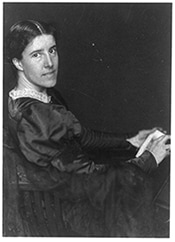 Charlotte Perkins Gilman. (Public Domain photo by Frances Benjamin Johnston.) Charlotte Perkins Gilman. (Public Domain photo by Frances Benjamin Johnston.) Charlotte Perkins Gilman was not only a writer, but a champion of women’s independence and reform. A major theorist in the women’s movement in the U.S., Gilman used her short stories, poetry, nonfiction and lectures in social reform, ethics and feminism to make a difference. In the Beginning Charlotte’s childhood was not the easiest. She was born in Hartford, Connecticut on July 3, 1860 to Mary Perkins and Frederic Beecher Perkins, but her father wasn’t in the picture for long. Early on, Frederic abandoned his family: Mary, Charlotte, and Charlotte’s brother, Thomas. Frederic’s abandonment left his family impoverished. In turn, during her childhood, Charlotte’s family was forced to move frequently just to make ends. This lack of a consistent environment impacted Charlotte’s education and friendships growing up. In fact, Charlotte went through seven different schools and was never noted as a particularly good student; however, her teachers did note that Charlotte’s innate intelligence and the scope of knowledge were remarkable. This lead Charlotte to enroll in several courses at the Rhode Island School of Design in the late 1970s. It was during this time that Charlotte became more interested in creative pursuits, including painting and writing. Adulthood: Marriage and Creative Pursuits In 1884, Charlotte married a fellow artist, Charles Stetson, and the two had one daughter, Katherine. Charlotte and Charles were married for a decade, a time period that Charlotte spent a good portion of in depression. During this this time, Charlotte experienced a nervous breakdown and underwent odd treatments for her melancholy and desolation. In turn, her experiences inspired her most well-known work, “The Yellow Wallpaper,” which she published in the Feminist Press in 1892. The short story details a woman who was suffered a mental episode after being emotionally deprived by her husband. The woman is stuck in a small room and becomes obsessed with the yellow wallpaper. The story illustrates how the woman is forced to “rest” and do only as her doctor and husband insist in the story, which leads her to become obsessed with the room’s yellow wallpaper. This prescriptive treatment completely forbids the character from any independence proves to be greatly destructive to her mental health. In “The Yellow Wallpaper,” Charlotte showcased women’s lack of autonomy, and the great need for it, in society. Charlotte went onto lecture about labor, ethics and the woman’s place in society in the 1890s. In 1898, she wrote Women in Economics, a nonfiction--frequently referred to as a manifesto and even used as a textbook--where she argued the case and need for women to have greater independence in economics. And, in 1909, Charlotte began a feminist magazine called Frontrunner, which she published and edited women’s issues and social reform articles. Additionally, Charlotte helped found the Women’s Peace Party in 1915 along with Jane Addams. Death and Legacy After suffering from breast cancer and going through ineffective treatments, Charlotte committed suicide in 1935. Her writings, though somewhat controversial at times, helped introduce feminist ideas and argued that women could do more than bare and raise children. Charlotte’s efforts assisted in leading the women’s movement and changing the way that women were not only viewed in society, but also laying the groundwork for the roles that women could, and would come, to play.
0 Comments
|
Archives
July 2017
Categories
All
|
 RSS Feed
RSS Feed